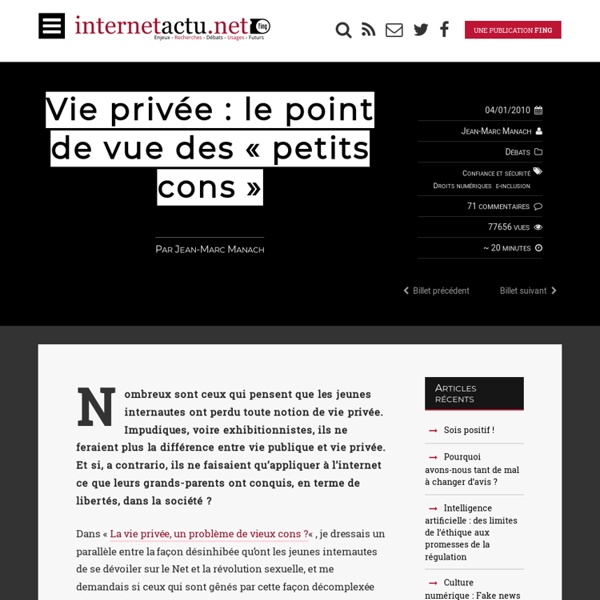



http://www.internetactu.net/2010/01/04/vie-privee-le-point-de-vue-des-petits-cons/
Should people “live tweet” during an event or presentation? « To January 11, 2010 Tony Hollingsworth Social Networking, Twitter I recently attended a course called “Presenting with Confidence“, delivered by Steve Herzberg. Danah Boyd: Why Parents Help Tweens Violate Facebook's 13+ Rule "At what age should I let my child join Facebook?" This is a question that countless parents have asked my collaborators and me. Often, it's followed by the following: "I know that 13 is the minimum age to join Facebook, but is it really so bad that my 12-year-old is on the site?" While parents are struggling to determine what social media sites are appropriate for their children, government tries to help parents by regulating what data internet companies can collect about children without parental permission. Yet, as has been the case for the last decade, this often backfires. Many general-purpose communication platforms and social media sites restrict access to only those 13+ in response to a law meant to empower parents: the Children's Online Privacy Protection Act (COPPA).
Global Population Density at a Glance (Infographic) Fathom Information Design/Promo image This population density map is making the rounds on the blogs today, to near-universal acclaim. And for good reason; it might be the most intuitive look at global pop. density ever cobbled together. The brainchild of Fathom Information Design, 'Dencity' uses small pixels to connote density, big ones to convey wide-open, unpopulated spaces. Fast Company explains why the design works: In the visual syntax of infographics and maps, bigger equals... well, bigger.
50 Cool Search Engines for Serious Readers The Internet has proven itself as a valuable resource for all types of readers, from collectors of rare books to tech-minded readers who shop, network and download books online. But if you’re having trouble finding exactly what you need, whether it’s a book review, a book by a certain author, or a digitized anthology for your class at an online college for creative writing, you’ll want to use sophisticated tools that direct you to high-quality resources. Here are 50 cool search engines for serious readers and students. For even more great search engines, read our updated list. Privacy in an Era of Social Media The Mediasite presentation cannot be played back. The requested presentation content can be played using the following plugins:WindowsMedia, Silverlight We have detected that your browser supports the following plugins:None
The state of social learning and some thoughts for the future of The State of Learning in the Workplace Today I first released the State of Learning in the Workplace Today on 1 January 2010 and regularly updated it through the year with new thinking, particularly that of my colleagues in the Internet Time Alliance. I then expanded it to form the first part of my Social Learning Handbook , which was published in mid-January 2011 (You can read a Synopsis here.)
The Evolution from Private to Public: Is There Privacy in the Digital Age? Duration: Approximately 60 minutes. Cost: Free Sponsored by: O'Reilly authors, Terence Craig & Mary Ludloff, "Privacy and Big Data" The Power of Twitter in Information Discovery It surprises me how many really smart people I meet still doubt the power of Twitter. It seems the urge to be a naysayer of Twitter is really strong for some. I think some of this stems from the early days of Twitter when it was presumed that it was a technology to tell people what you ate for lunch. Twitter never seemed to really take the offense in PR and marketing. I guess it wasn't in their DNA.
Save Scholarly Ideas, Not the Publishing Industry (a rant) The scholarly publishing industry used to offer a service. It used to be about making sure that knowledge was shared as broadly as possible to those who would find it valuable using the available means of distribution: packaged paper objects shipped through mail to libraries and individuals. It made a profit off of serving an audience. These days, the scholarly publishing industry operates as a gatekeeper, driven more by profits than by the desire to share information as widely as possible. It stopped innovating and started resting on its laurels. And the worst part about it? Portail Innovation et expérimentation - Article - Former à l'innovation, innover dans la formation eNq1V01z2jAQvfdXeHzHJpNAko5JpqVJy0wypUmY9sYIew2iiuSsZAz99ZUNNHbGShMbnbC94j3taj+egsv1I3NWgJIKPnCPvK7rAA9FRPl84E4erjtn7uWF8yFYkhUpr+t73elJz3VCRqQcuLnZmwHh0vt1e/MFNAKgq//oBGK2hFBVFqaKMu8bkYtbkhSLnGAlaOQ8glqIaOAmqdp+dgKpUG/lIhGoCBsSBXOBm8Dffa6sWU77FUPg56Bvgqfyp8DfMiEhjFGsaARRPUdMmISmLHEWjYlajHgs6tF97YJPwjAFypqSZHtHTEE6aR6kiQS8IXxuN0ZDwRWsVR4qQ5iKbGgeIirHRTpZdCPNIyVCwgzHEON0ct8UHOHpHnDF4LUYRVQmjGy8pUxa8PxIATf3xWs9D40GLepuRiRMkNVDL5RKPvp+lmUeCTsJQSq9GPeH77fwynqGIUiRom4mRoZl+CgPUe66c1EeiUxaSGJdJwSJtgPqRm2xWsIUEbiy2N7Hlflh0RUqR/wadX59j2NqasIK08YESelIXqC/adKaGcpFXUXWFoJINhVopgeBt20NrsOAz9VCC4N/WDsanZywHrjd5+/GAy1sz4Eo3gra/b5LtsDfOttghqHtvj8UKVemLG7e9akcqvUugylIi06QJVnfwdPIgP1Jm/VWVKfbOTo+P+0f989OT3rnZy11RTEtrVbmXakrWyX6vB1rtvUFMQ3lGBt3l6JP1qOG095x77Rxjy8nbz1Bi4meH+kD6usH0xyGgPskSRj1M5jpB9nZ64j97wGGcZLOXlDzlDH/3YfbUBEdSlPoeOryT0Gqyd3odYF0CJmpJb9ZZjYKoEZ8swMHDJrhctfIBS1Z0hmjIVH6wm1TetmWwltLPfbXq4cW0/B551ab+bAqTi1y7Wppd7c7vHTUZfH/e2NeD+0m+U7/WAzUH8ENynpbNC3E+9X7t1vSooGfS2P98BcLri64
How Parents Normalized Teen Password Sharing In 2005, I started asking teenagers about their password habits. My original set of questions focused on teens’ attitudes about giving their password to their parents, but I quickly became enamored with teens’ stories of sharing passwords with friends and significant others. So I was ecstatic when Pew Internet & American Life Project decided to survey teens about their password sharing habits.